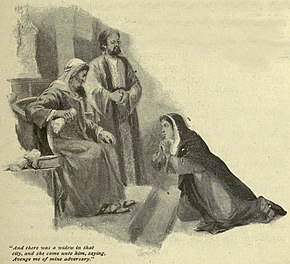

The Parable of the Unjust Judge (also known as the Parable of the Importunate Widow or the Parable of the Persistent Woman, is one of the parables of Jesus which appears in the Gospel of Luke (Luke 18:1–8). In it, a judge who lacks compassion is repeatedly approached by a woman seeking justice. Initially rejecting her demands, he eventually honors her request so he will not be worn out by her persistence.
One interpretation of this parable is that it teaches the principle of never giving up. It is found immediately prior to the parable of the Pharisee and the Publican (also on prayer) and is similar to the Parable of the Friend at Night. Other scholars note that the content of the parable makes no reference to prayer and that the introduction of prayer as a theme is generally inspired by the Lukan construction in verses 6–8 and by the fact that Luke placed the parable of the Pharisee and Publican immediately after this one. Whatever approach is taken, it is noteworthy that the judge in the parable does not act on the basis of justice.
Narrative

Luke reports the parable as follows:
Then Jesus told his disciples a parable to show them that they should always pray and not give up. He said: "In a certain town there was a judge who neither feared God nor cared about men. And there was a widow in that town who kept coming to him with the plea, 'Grant me justice against my adversary.'
"For some time he refused. But finally he said to himself, 'Even though I do not fear God or care about men, yet because this widow keeps bothering me, I will see that she gets justice, so that she will not eventually wear me out with her coming!'"
And the Lord said, "Listen to what the unjust judge says. And will not God bring about justice for his chosen ones, who cry out to him day and night? Will he keep putting them off? I tell you, he will see that they get justice, and quickly. However, when the Son of Man comes, will he find faith on the earth?"
— Luke 18:1–8, New International Version
Interpretation
The framing material of the parable in the Gospel of Luke demonstrates the need to always pray like the persistent widow, for if even an unjust judge will eventually listen, God is much quicker to do so. The parable of the Friend at Night has a similar meaning.
Joel B. Green sees in this parable an injunction not to lose heart, in the light of the eschatological tone of Luke 17:20–37, and also an echo of Sirach 35: "For he is a God of justice, who knows no favorites. The prayer of the lowly pierces the clouds; it does not rest till it reaches its goal, nor will it withdraw till the Highest responds, judges justly and affirms the right."
William Barclay says that the point of the parable is less about persistent prayer, but rather the contrast between God and men in the phrase "how much more." In prayer one is speaking to a Father ready to give.
Cornelius a Lapide comments on this parable, writing, "Hence the heretics called Euchitæ wished, but without reason, to be always praying and to do no manual work. But it is written, 'If any man will not work, neither let him eat' (2 Thess. 3:10). 'Always' here seems to mean sedulously, perseveringly, diligently, assiduously as in other things, and at befitting times, especially when temptation, persecution, and affliction are hard at hand. It is impossible for us to pray always and at all times. We must have a time for eating, drinking, labouring, etc. The word 'always' means, therefore, not continuance but perseverance in prayer: that is, that we should set apart fit times for prayer, and not cease to pray until we have obtained what we need and what we ask for."
See also
References
- Luke 18:1–8
- ^ Joel B. Green, The Gospel of Luke, Eerdmans, 1997, ISBN 0802823157, pp. 63643.
- Craig L. Blomberg, Interpreting the Parables, InterVarsity Press, 1990, ISBN 0830812717, p. 275.
- Luke 17:20–37
- Sirach 35:12–18, New American Bible.
- Barclay, William. The Parables of Jesus, Westminster John Knox Press, 1999 ISBN 978-0664258283
- Lapide, Cornelius (1889). The great commentary of Cornelius à Lapide. Translated by Thomas Wimberly Mossman. London: John Hodges.
| Jesus | |
|---|---|
| Chronology of Jesus's life |
|
| New Testament | |
| Historicity | |
| Depictions | |
| Christianity | |
| In other faiths | |
| Family |
|
| Related | |